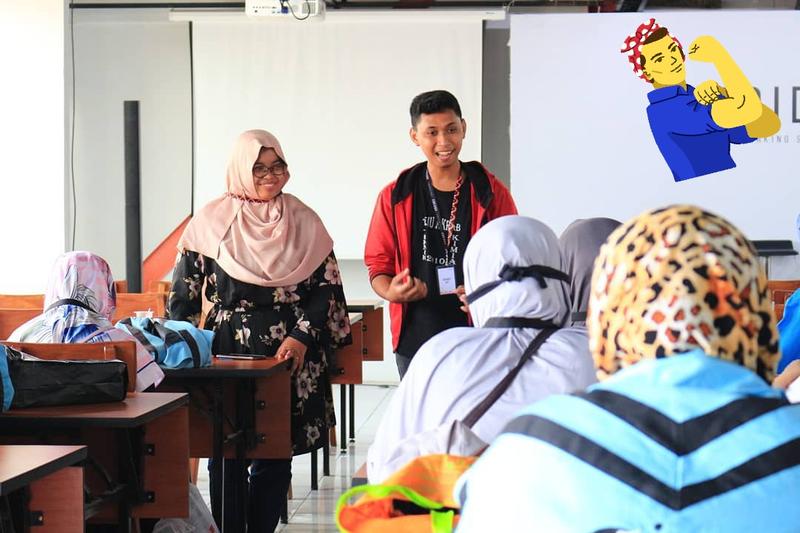Lessons from Ojesy's Fall and Looking at Online Sharia Business Opportunities
Online sharia business opportunities are still wide open
Before Gojek and Grab to be the giant he is today, five years ago, player ride hailing Many local people are trying their luck in this sector. If you want to mention the number, it can be more than a count of fingers. The average embedding the word "taxibike” or slices as the naming of the identity.
The majority now have only names and few are still firm with the opportunities that still exist. The only player who is quite unique and Branding strong because it positions itself as a sharia business is Ojesy (stands for Ojek Syar'i).
The company was founded in 2015 in Surabaya by a 19 year old student, Evilita Adriani and Reza Zamir. His enthusiasm at that time was a form of concern for the incidence of sexual harassment that often afflicts women when using public transportation.
Within four years, Ojesy grew rapidly to be able to expand to 25 cities. Apart from Jabodetabek, this service goes to Surabaya, Malang, Gresik, Purworejo, and other cities. The number of driver partners has reached 800 people. All partners are women, wear headscarves, dress loosely, and have permission from their husbands and family (if they are married). Its target users are women and children.
With a model like this, Ojesy is able to survive up to four years in the midst of increasingly complicated competition versus Gojek and Grab. At the end of last year, finally Ojesy raised the white flag. They withdrew because their business model backfired for the company itself.
To DailySocial, Co-Founder Ojesy Evilita Adriani revealed, the company relies on a delivery subscription business model for school children and employees at a cost of IDR 300 thousand per month. The company's business cycle has been read, that the decline will still occur every semester break and new school year.
“Our position at the end of every semester and school holidays always goes down. We know the tempo must be like that and patternit keeps repeating. Moreover, we cannot survive this pandemic with such a business model," he said.
Companies have been looking for ways to patch this repetitive rhythm with marketing activities, but to no avail. “Our monthly turnover has reached IDR 80 million per month with 100 drivers. That's the highest."
However, the biggest trigger for the company's problems comes from internal conflicts. "Fraud, mismanagement, bad public relations, plus financial minus uncontrollable. Finally decided with a heavy heart to close everything at the end of 2019. All that's left is the debt," Evilita wrote on the account page LinkedIn.
All of Ojesy's employees have been laid off and their severance pay has been met. Now the debt inherited by Ojesy still trying to finish it. The application has also been closed.
ShariHub learning and pioneering points
Evilita and Reza both started Ojesy at a very young age, which is 19 years old. Although this achievement can be said to be "fair", on the other hand, there are many lessons to be learned. One of the things he feels is that he always feels rushed in taking action and is plagued by feelings of restlessness.
“I feel flattered when compared with Grab and Gojek at that time, indicating that I was equal to them in their time, “wrote Evilita.
Even though at the same time their knowledge and experience is still far from what the company needs. “I feel Ojesy is growing too fast that we can't control ourselves. Don't know how manage financial and operational, so we are in a hurry and in the end we are not vigilant.”
The next lesson is from the leadership side. At that time Ojesy did not work as a team. All decisions are taken by top management. “So like superman, now [at the new company, SyariHub] it is more superteam and more compact."

He corrected all of these lessons when he founded his new startup, an online private tutoring platform ShariHub, at the beginning of this year with existing from the previous company. At that time the Ojesy application had been downloaded more than 80 thousand times. The segment entered is still sharia, even though the industry is different.
Currently SyariHub provides educational services for Koran training. Before settling down there, Evilita had pivoted into the catering business and nanny by staying on the path of sharia. With limited resources, both businesses have more complicated challenges.
"Now we only play the Koran online because it is easier to find resources, the business process is not as complicated as catering or nanny."
Before settling on this online Koran segment, he did in-depth research regarding the potential in it. It was found that as many as 50% of Indonesians cannot recite the Koran, even though the majority of the Indonesian population is Muslim.
The hypothesis is proven. In April 2020 with this business model, its finances and turnover recorded an increase. “Until last month [July, the double-digit growth] had been exceeded. This is my personal best financial peak,” he continued.
As of now, SyariHub has more than 100 subscribed users. They are scattered in the country and abroad, such as Malaysia, Singapore, Brunei Darussalam, and Abu Dhabi. Most of these users are Indonesian workers and Indonesian citizens residing in the country.
There are now 15 teaching staff members. They come from pesantren teachers and have already pocketed teaching certificates. “The ShariHub team is partly taken from Ojesy.”
In this online recitation process, participants will be taught in live private sessions (1-on-1) using the platform video call, like Zoom. SyariHub does not yet have its own application that can accommodate these needs, only a site to register.
“The challenge here is to uniform the Koran curriculum because in Indonesia there are many Koran methods. So our solution is to adapt to demand consumer. They can request to be taught a certain method.”
Learning from previous experiences, he wants to build SyariHub slowly and still pay attention to consumer needs. "We want focus one product first, then it will slowly develop. The point is that SyariHub will be parent company, but we will remain calm with the current business model," he concluded.
Variety of sharia digital services so far
Under the leadership of the President and Vice President, the Islamic economy has received a red carpet position and it is hoped that its contribution to the country will be more significant.
The government enacted PP No. 28 of 2020 concerning the National Committee for Islamic Economy and Finance (KNEKS) which specifically has the task of accelerating, expanding, and advancing the development of Islamic economics and finance in order to strengthen national economic resilience.
In an effort to accelerate the growth of Islamic financial assets in Indonesia, KNEKS has compiled the 2019-2024 Indonesian Islamic Economic Masterplan. One of the pillars is the strengthening of sharia businesses and the digital economy ecosystem.
From OJK data last year, the national sharia financial literacy index in Indonesia in 2019 only reached 8,93%, while the national sharia financial inclusion index in the same year only reached 9,1%.
Compared to Malaysia, Indonesia's seriousness in working on the sector is still far behind. STIE SEBI sharia economic observer Aziz Setiawan said, Indonesia still has some homework large scale. The blueprint for sharia economics and industry made by the government has not been fulfilled, so it needs to be sharpened by the relevant government institutions.
The government also needs to work faster in implementing planning and being responsive, as Malaysia did. "Maybe we are already behind with Malaysia by about a decade or two for this sharia economy," he said.
From a private perspective, the government's move is welcomed by participating in it, considering that there is great potential waiting to be worked on. It can be seen from the incessant Tokopedia with the Tokopedia Salam feature and Shopee with Shopee Barokah.
Then there is LinkAja, which specifically releases sharia services and is still the only e-money player in Indonesia that has it. Since its release last year, LinkAja Syariah has had more than 185 thousand registered users.
There are eight cross-sectoral parties that have supported the implementation of LinkAja's sharia electronic money, coming from the central, regional, district, and national government agencies.
In its own application, LinkAja Syariah fulfills the needs of digital transactions by applying Islamic sharia principles, such as top-up balances to and from all Islamic banks, digital qurbani, digital payment of school and boarding school fees, cash waqf for shares, payments at a number of e-commerce partners. , and various other transactions.
Digital players who have entered the sharia business, according to records DailySocial, has only been worked on by two sectors, namely fintech and e-commerce. In the fintech sector, AFPI noted that of the 158 p2p lending companies currently operating, 11 of them are in the form of sharia. Only 1 of these 11 companies is in the form of a business unit, the rest are fully operational under the sharia flag.
Citing the State of Global Islamic Economy Report 2019/2020, Indonesia's score is 49, ranking 5th out of 73 countries. The score is calculated from a number of sectors such as Islamic finance, halal food, Muslim-friendly tourism, fashion, media and recreation, as well as pharmacy & cosmetics. Halal food and Islamic finance are the two largest sectors that contribute to the scoring for Indonesia.
Sign up for our
newsletter

